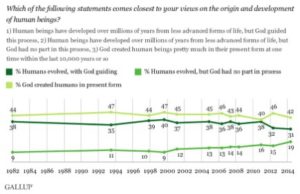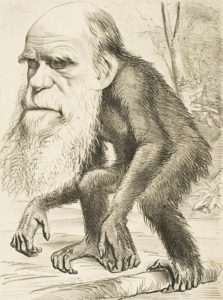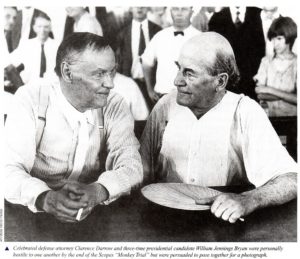Room for Differences on Creation

Tim Keller stepped down as the Senior Pastor for Redeemer Presbyterian Church in New York City in July of 2017. Redeemer also split into multiple congregations, “actualizing our long-stated plan of shifting from being a single large church with multiple congregations to becoming a family of smaller churches.” Keller said his new role would be as a teacher and trainer for the next generation of leaders and pastors within the Redeemer family of churches. “The gospel is a living force, always sending and giving—and as I am sent in a new way now, so is every member of Redeemer, to love and serve this great city.” And yet he has been smeared as having such a low view of Scripture and creation, “that he goes out of his way to promote the false doctrine of theistic evolution.”
The above is the stated opinion of E.S. Williams in “Keller’s false gospel” on The New Calvinists website. Williams has also written a book titled The New Calvinists, which critiques Keller and others. Williams claims in the subtitle of his book these pastors are changing the gospel. In another article on The New Calvinists bashing Keller (there are several), “Keller’s theistic evolution,” Williams distorts Keller’s position by saying he believes the Bible must be made to conform to the ‘truth’ of science. “Keller does this by asserting [in The Reason for God] that the first chapter of Genesis is a poem.” He is certainly not the only critical source of Keller on his understanding of Genesis one and whether theistic evolution can be affirmed by those with a high view of Scripture.
Ken Ham, the founder of Answers in Genesis (AiG), has also been critical Tim Keller. He said: “It is so sad to see a great Bible teacher like Tim Keller promote belief in evolution to the church.” Ham contends Keller and others have misunderstood what he and Answers in Genesis are saying in relation to the loss of biblical authority. According to Ham, this is the result of “contributing to undermining the authority of the Word of God by accommodating man’s ideas of evolution or millions of years into Genesis.” He believes there has been “an increasing generational loss of Biblical authority because so many in the church have opened the door to compromise beginning in Genesis.”
Within a document, “Where Do We Draw the Line?,” AiG said it is made up of “Christians who unite to defend the authority of the Bible in today’s secular culture.” That is what they say they are about—“the authority of the Bible, often in Genesis.” An example of how the issue of Biblical authority is understood by AiG has to do with the age of the earth.
For example, the secular world has been teaching that the earth is billions of years old. The Bible, based on genealogies recorded throughout the Scriptures and the context of the Hebrew word yom (day) in Genesis 1, reveal that the earth is thousands of years old. So, this question becomes a biblical authority issue. Is one going to trust a perfect God who created all things (Genesis 1:1), has always been there (Revelation 22:13), knows all things (Colossians 2:1–3), and cannot lie (Hebrews 6:18), or trust imperfect and fallible humankind who was not there and speculates on the past?
In the original AiG article, you can see links that elaborate their understanding of “genealogies,” the “context” of the Hebrew word yom (day), and whether the earth is “thousands of years old.” There is also a chart that lists “a sampling of biblical authority topics” such as the age of the earth, evolution and whether or not Noah’s flood was global or local as issues of biblical authority. AiG said the Bible does not teach the earth is millions of years old; that man was specially created from dust and the woman from the man. An evolutionary worldview says humanity came from an ape-like ancestor. And Genesis 6-8 affirms the Flood was global, covering the highest mountain by over 15 cubits. “Those appealing to a local Flood trust secular authorities who say that the rock layers are evidence of millions of years instead of mostly Noah’s Flood sediment.”
Additional examples of topics on biblical authority in the chart include the Trinity and racism. The article went on the say: “Basically, AiG is involved when any issue impacts the authority of Scripture—especially when human claims run counter to what God teaches.” What seems clear is that AiG’s position is that any Christian seeking to affirm the authority of Scripture necessarily has to acknowledge an understanding of Genesis that aligns with its own position. AiG believes the age of the earth is in the neighborhood of thousands, not millions, of years; that there was a global flood covering the highest existing mountains of the time of Noah; and that humans were specially created out of dust. Tim Keller and other Christians who allow for or teach any views that do not agree with this understanding of Genesis are therefore undermining the authority of the word of God.
The weight given to these positions is seen clearly in the AiG Statement of Faith, last updated on August 10, 2015. In order to preserve the function and integrity of the ministry “in its mission to proclaim the absolute truth and authority of Scripture,” employees and volunteers should abide and agree to the AiG Statement of Faith. Board members for the AiG ministry must hold to the following six tenets:
- Scripture teaches a recent origin for man and the whole creation, spanning approximately 4,000 years from creation to Christ.
- The days in Genesis do not correspond to geologic ages, but are six [6] consecutive twenty-four [24] hour days of creation.
- The Noachian Flood was a significant geological event and much (but not all) fossiliferous sediment originated at that time.
- The gap theory has no basis in Scripture.
- The view, commonly used to evade the implications or the authority of biblical teaching, that knowledge and/or truth may be divided into secular and religious, is rejected.
- The view, commonly used to evade the implications or the authority of biblical teaching, that knowledge and/or truth may be divided into secular and religious, is rejected.
While Ham and AiG does not go as far as E.S. Williams in claiming Keller and others are promoting a false gospel, Ham and AiG do seem to believe that if Keller and others disagree with the AiG understanding of Genesis on creation, the age of the earth, and whether the Noachian Flood was local or global, they have a low view of Scripture. A recent origin for humans and creation (approximately 4,000 years from creation to Christ), six 24 hour days for creation, and a global, Noachian Flood are non-negotiable beliefs about creation, according to AiG.
The Gospel Coalition (TGC), an evangelical ministry founded by Tim Keller and Don Carson, posted a video discussion between Tim Keller, Ligon Duncan and Russell Moore on what is necessary to be believed; what are the non-negotiable beliefs about creation. Both Duncan and Moore are council members for TGC.
Keller led off the dialogue on the essentials of what has to be believed about the Bible when talking to nonbelievers. Keller said the relationship of God to the creation—the Creator/creation distinction—should be stressed. He said nonbelievers may want to talk about creation as a religion versus science battle, but he suggested to not go there. “The relationship of creation to evolution isn’t the heart.” There are at least four, five or six orthodox Christian views of evolution, according to Keller. “But let’s not go there at first.”
Duncan said he’d want to tell the skeptical, intelligent unbeliever that Christianity and science are not in conflict. Protestant Christianity laid the philosophical foundation for the rise of science.
Within the church, Duncan thought the essentials or boundaries of what we have to agree on in order to recognize each other as orthodox are: creation ex nihilo, the goodness of creation and the special creation of Adam and Eve. By creation ex nihilo, Duncan meant there is a Creator-creature distinction—God was the Cause of everything else. Adam and Eve have to be acknowledged as the fountainhead of humanity to support the federal headship of Adam to have the Adam-Christ parallel for the gospel.
Keller said he would want to talk first about the first two points, the Creator-creature distinction and the goodness of creation, with a nonbeliever. With a Christian, he said he would discuss Adam and Eve, saying there are a lot of different understandings about how old the earth is, what the days are in Genesis 1, and to what degree evolution was a part of how God created things. “But where I would stop is, with Adam and Eve.” Keller said there had to be an actual Adam and Eve, otherwise he doesn’t understand how the Pauline view of salvation in Romans 5 works.
He acknowledged that the consensus, even among Christian scientists, is that all human beings were not genetically related to a human couple. It had to be a little group of people somewhere in sub-Saharan Africa. “But when I read the text … it sure looks like it’s saying that God created Adam and Eve. And he didn’t just adopt … a human-like being and put in the image of God.” Keller said the text said he created them out of the dust of the ground. He thought he had to let his reading of the text correct his understanding of the sciences.
Science is a way of telling me truth. And the Scripture is a way of telling me truth. But if they are clashing, even though I know the science might show me I’m reading the Scripture wrong, and that has happened in the past, where the science came in and said “Are you really … does the Bible really teach that the sun revolves around the earth? So it’s possible for the science to make you ask, “Did you read the text right?” But if you go back and read the text and you come to your conclusion, that as far as you can say before God “I’m trying my best to read this as I think what the Scripture says.” Right now it says to me, … and everyone came from Adam and Eve and they were special creations. And so even though I don’t have an answer to my science friends, that’s where I stand.
I don’t think Tim Keller compromised biblical authority in what he said; nor did he preach a false gospel. I do see him saying belief in the authority of the Bible has room for differences on how to interpret Genesis 1 and whether the age of the earth is 6,000 years. It may even have room for some form of evolution. AiG and E.S. Williams vehemently deny this possibility. AiG has linked a denial of evolution, a localized flood, and an age for the earth and creation around 6,000 years with the Trinity and racism as key issues of biblical authority. So it doesn’t seem they would stand with Keller or any other Christian—which includes me—who won’t affirm their understanding of Genesis. For more articles on creation in the Bible, see the link “Genesis & Creation.”





